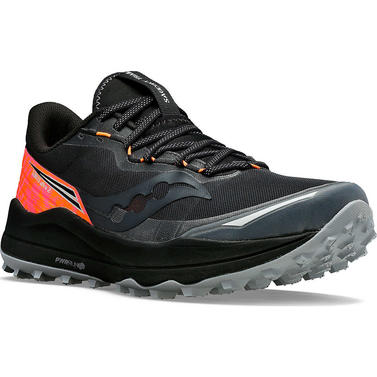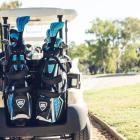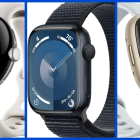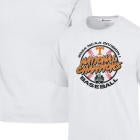
Now that the weather has warmed up, we runners are heading out to the trails. (I know, I know: Some of the more devout trail runners never left.) I'm a newcomer to trail running, but I've been running on roads for years and hiking for just as long, so I already have a good sense of what the sport demands in a shoe: comfort and exceptional traction so I can land confidently on loose or uneven terrain. The best trail running shoe should also have a bit more structure and support to prevent your foot from sliding or your ankle from rolling.
Now that I've had the chance to try out a few different trail running shoes, I've honed in on exactly what makes a shoe comfortable and enjoyable to run in. Whether you're newer to the sport like me, or one of those dedicated trail runners who avoid pavement like the plague, here are the trail running shoes I'd recommend for every type of off-road runner.
Best trail running shoe overall: Nike Pegasus Trail 5

I should start by saying that I'm a huge fan of the Pegasus line, and the Nike Pegasus 41 is my new go-to daily trainer. So it's not surprising that I enjoyed the fit and feel of the Nike Pegasus Trail 5, which is essentially the off-road version of my favorite running shoes.
My local trail is relatively flat, but uneven thanks to random tree roots and boulders. It's also very mixed terrain, starting with a mostly paved path that switches to a dirt trail when I reach the nearby nature preserve. So I run on a mix of asphalt, wood and dirt, and I enjoy the grip and traction on the Pegasus Trail 5 outsole across all of it. It's grippy enough to feel secure in my footing on loose gravel or dirt without being too sticky on the paved sections of my run.
Featuring the same ReactX midsole as the Pegasus 41, the Pegasus Trail 5 feels plush and springy. Despite the plush feeling of this shoe, on my latest run, I still felt like I had good ground connection -- maybe not enough to navigate super technical terrain or steep inclines, but plenty for the relatively level but uneven trail near me.
The upper is snug yet comfortable and breathable, so my foot felt secure without getting hot. I credit the flywire technology on the laces for that fit. It gives runners some room for adjustment to lock down your midfoot without feeling like the laces are digging into the top of your foot.
With that said, I can see the upper feeling too tight for runners who prefer flexibility. And anyone who thinks Nike shoes are too narrow in the toe box will have the same complaint here, especially since there isn't a wide version.
But if you like a snug fit like I do, the Nike Pegasus Trail 5 is a really enjoyable trail running shoe. It's lightweight, transitions smoothly between different terrains and doesn't feel hot even when running on a hot, humid summer afternoon.
What the Nike Pegasus Trail 5 shoes are best for:
- Mixed terrain
- Everyday runs
- Runners who prefer a snug upper over a flexible one
- Runners who want a breathable, lightweight trail running shoe
- Runners with neutral pronation
Shop men's sizes:
$150 at NikeShop women's sizes:
$150 at NikeBest trail running shoe for recovery runs: Hoka Stinson 7

The Hoka Stinson 7 is another versatile trail running shoe built for mixed terrains, but after running in it, I think it's better suited to slower, easier runs than my Nike Pegasus Trail 5s. My size 8 shoes weigh 10.8 ounces, over two ounces heavier than my Nikes, and I can definitely feel the bulk.
The tradeoff for that added weight is that the Stinson 7s are an incredibly plush ride. These are the opposite of a barefoot running shoe. The tall stack of foam in the midsole (42 mm tall for men's sizes, 40 mm for women's sizes) made it feel like I was running on pillows, not root-riddled dirt trails. So on a recovery run or a hike, these would feel great and the added weight wouldn't bother you too much because you're not trying to build up speed anyway.
Another reason these Hoka Stinson 7s would crush it as a recovery shoe is the high level of support built into the shoe. The stabilizing H-frame prevents your foot from over-pronating and wrap-around side walls prevent excessive side-to-side movement. Meanwhile, all that stabilizing structure is balanced out by a stretchy upper and a roomy toe box that makes for a looser fit on the top of your foot.
Overall, this is a solid stability shoe that would work well for someone with overpronation or anyone who prefers a plush, supportive running shoe for slow to moderate-paced runs.
What the Hoka Stinson 7 shoes are best for:
- Mixed terrain
- Everyday runs, recovery runs or hiking
- Runners who prefer a wider toe box
- Runners who want a super supportive, plush trail running shoe
- Runners with netural or overpronation
Shop men's sizes:
$170 at HokaShop women's sizes:
$170 at HokaBest trail running shoe for tough terrain: Saucony Xodus Ultra 2

I haven't tried the Saucony Xodus Ultra 2 yet, but I've been eyeing them for a while as something to take on longer, more difficult trail runs. Built for ultra runners, the thick layer of foam is made to cushion impact while still being light and responsive enough to allow you to build up speed. While I won't be running an ultra marathon any time soon, I like the idea of having a shoe that's comfortable without feeling too bulky to wear on longer trail runs.
The 4.5 mm lugs provide the grip you'll need on looser terrain like gravel or dirt while the multi-directional chevron shape of those lugs improves traction on smooth or slippery surfaces like solid rock. That's paired with a breathable yet snug-fitting upper that helps keep your foot stable.
If your regular trail includes long stretches of paved road, they might stick a bit and likely wouldn't feel as smooth as, say, the Nike Pegasus Trail 5. But for trails that are exclusively off-road, I could see these easily being a more stable and secure ride than either the Nike or Hoka trail running shoes I've tried.
What the Saucony Xodus Ultra 2 shoes are best for:
- Tough or hilly terrain
- Both short- and long-distance trail runs
- Medium- to fast-paced runs
- Runners with neutral pronation
Shop men's sizes:
$120 and up at SauconyShop women's sizes:
$120 and up at SauconyBest super shoe for trails: Salomon Pulsar Trail Pro 2

Super shoes can be a lot of fun to run in, but the majority are built for roads, and I can only imagine they'd feel extremely unstable on any surface that isn't paved. But if you're gearing up for an ultra marathon or you've just signed up for a marathon that includes some mixed terrain, you need a super shoe that can build up speed while keeping you stable on rough terrain.
Salomon has created the Pulsar Trail Pro 2 to do just that. I haven't run in these, but these are the super shoes I'd get if I ever become crazy enough to sign up for an ultra.
The 3.5 mm rubber lugs on the outsole are deep enough to grip rocky or uneven terrain but not so deep that they would slow you down on a paved road. Another feature you'll appreciate on the trail is the stretchy, fitted collar that keeps debris out while adding a little extra support around the ankle.
As for the super shoe technology, the Salomon Pulsar Trail Pro 2 includes a carbon fiber plate through the midsole, a layer of the brand's bouncy Energy Foam and a rocker midsole. Taken together, those features deliver an energy-efficient design that allows your foot to transition smoothly from heel to toe and then pop forward at the toe-off.
Combining that pop with the grip and stability you need to navigate trails is no easy feat, but I think Salomon has done it with this running shoe.
What the Salomon Pulsar Trail Pro 2 shoes are best for:
- Mixed terrain
- Both short- and long-distance runs
- Fast-paced runs and racing
- Runners with neutral pronation
Shop men's sizes:
$120 and up at SalomonShop women's sizes:
$120 and up at SalomonBest trail running shoes on a budget: Merrell Morphite

I'm a fan of Merrell hiking boots because they're durable and affordable. So even though I haven't tried the brand's trail running shoes yet, that's the brand I'd turn to for a budget-friendly pair that's still reliable. The Merrell Morphite is a mixed terrain trail running shoe that regularly retails for just $100 -- and right now, select sizes are on sale so you can get them for even less.
A women's size 8 weighs 7.58 ounces, making them even lighter than my Nikes while the 26 mm stack height suggests it would have a good balance of cushion and ground connection. The rubber outsole with an array of different lug depths helps runners find their footing on a wide variety of surfaces -- though it's probably not specialized enough to handle super technical terrain.
If you're new to trail running or you don't run on trails often, these seem like a good pair to have on hand that won't break the bank. And if these Merrell Morphite trail running shoes are as durable as Merrell's hiking boots, you should be able to get quite a bit of mileage out of them.
What the Merrell Morphite shoes are best for:
- Mixed terrain, though probably nothing too hilly or technical
- Both short- and long-distance runs
- Slow, medium or fast-paced runs
- Runners with neutral pronation
Shop men's sizes:
$75 and up at MerrellShop women's sizes:
$75 and up at Merrell














